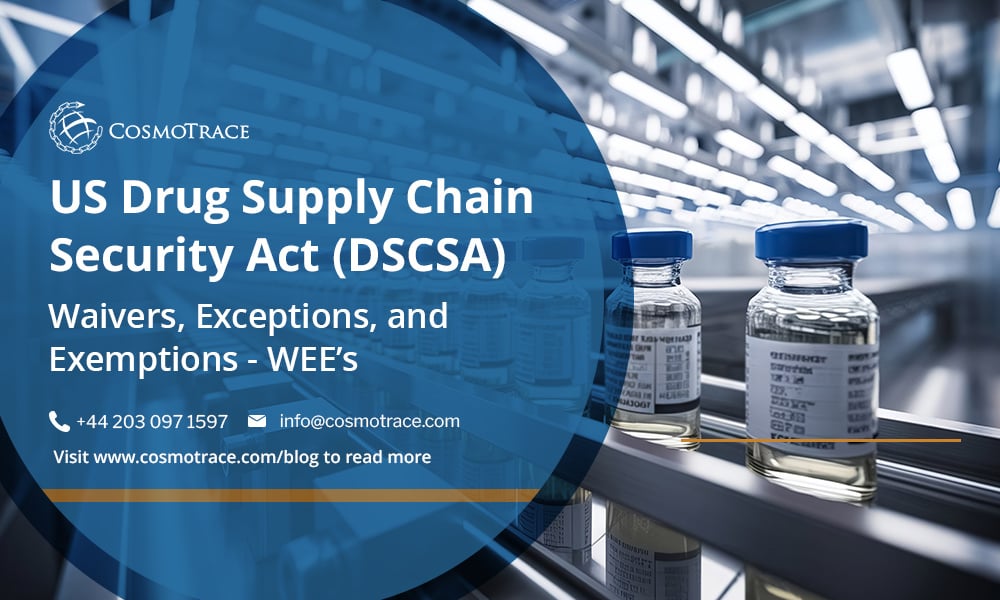The US DSCSA, enacted in 2013, aims to create a system for tracking prescription drugs as they are distributed within the United States. The act is designed to protect consumers from exposure to drugs that may be counterfeit, stolen, contaminated, or otherwise harmful. Over time, the DSCSA has incorporated specific WEE’s - waivers, exceptions, and exemptions for certain entities or circumstances to ensure efficient implementation and flexibility in the system.
Key Points on WEE’s under the DSCSA:
- Waivers: A waiver may be granted by the FDA if a manufacturer, repackager, wholesale distributor, or dispenser is unable to comply with certain requirements due to economic hardship, or if compliance would undermine the security of the drug supply chain. Waivers are typically temporary and are subject to periodic review.
- Exceptions: There are provisions for certain drugs or transactions to be excepted from the requirements of the DSCSA. For example, drugs intended for use in clinical trials or those designated as emergency medical products may be excepted from full compliance. Veterinary drugs and certain blood products are also examples of items that may fall under exceptions.
- Exemptions: Product exemptions apply to specific drugs that are exempted from DSCSA requirements, such as intracompany transfers of prescription drugs between locations owned by the same company. Exemptions for distribution to federal or state agencies during emergencies, or for certain products that are sold directly to consumers or to health care providers, might also be in place.
Some specific examples of waivers, exceptions, and exemptions:
- FDA Waivers for Specific Participants: If a company can demonstrate that compliance with a certain DSCSA requirement would cause significant economic hardship or compromise the drug supply chain's security, the FDA may grant a waiver.
- Exceptions for Blood Components and Radioactive Drugs: Specific products like blood components for transfusion or radioactive drugs often receive exceptions due to the unique nature of their supply chain.
- Exemption for Distribution to Military or During Public Health Emergencies: Special exemptions are granted for the distribution of drugs to military entities or during public health emergencies, allowing them to bypass some DSCSA requirements for quicker distribution.
Exemption to small dispensers, until November 27, 2026:
(DSCSA Exemptions from Certain Requirements Under Section 582 of the FD&C Act for Small Dispensers Until November 27, 2026.)
The FDA has extended certain exemptions under the Drug Supply Chain Security Act (DSCSA) for small dispensers until November 27, 2026. Since the 2023 Compliance Policy Guidance, stakeholders have expressed concerns about readiness to meet the requirements by the original deadline of November 27, 2024. These challenges include time, costs, and resources needed for developing robust technologies and processes for data exchange and business practices.
To address these issues, the FDA has issued exemptions allowing small dispensers additional time to transition to interoperable, electronic product tracing. These exemptions include:
- Verifying product identifiers of suspect or illegitimate products.
- Exchanging transaction information electronically.
- Including product identifiers at the package level.
- Verification systems and processes for package-level products.
- Responding to information requests during recalls or investigations using current methods.
These exemptions aim to ensure continued patient access to prescription drugs while small dispensers refine their systems.
WHO MAY REQUEST A WEE?
Exceptions: A manufacturer or repackager may request an exception to the requirements relating to product identifiers if a product is packaged in a container too small or otherwise unable to accommodate a label with sufficient space to bear the required information.
Waivers: An authorized trading partner may request a waiver if the above requirements would result in an undue economic hardship or for emergency medical reasons, including a public health emergency declaration.
Exemptions: An authorized trading partner or other stakeholder may request an exemption for other products or transactions.
WHEN DO I NEED A WAIVER OR EXEMPTION?
Waivers and exemptions requests are available when a trading partner does not believe it can comply with requirements in section 582. Stakeholders who are not trading partners may also submit an exemption request.
WHERE DO I SUBMIT A WAIVER OR EXEMPTION?
FDA currently maintains a webpage that details how to submit a WEE request, which is available here. Stakeholders should reference this webpage as they consider submitting a request.
Drugs regulated by the Center for Drug Evaluation and Research (CDER): CDER NextGen Portal
https://cdernextgenportal.fda.gov/Login_CDER?ec=302&startURL=%2Fs%2F
Requests that are not related to specific products or where the lead center is uncertain or unknown should be submitted through CDER NextGen Portal
Requests associated with products under approved applications should be submitted in eCTD format through FDA’s Electronic Submissions Gateway as product correspondence to the application.
Requests exclusively for CBER-regulated products but not associated with an application should be emailed to DSCSA-CBER-WEER@fda.hhs.gov
If you are making a product-specific request by NDC, you should determine whether the product is regulated by CDER or CBER. CDER-regulated product submissions are made to the CDER NextGen Portal and CBER-regulated product submissions would be made to DSCSA-CBER-WEER@fda.hhs.gov . In most, but not all cases, you can make this determination based on the product’s application.
DSCSA Compliance Deadlines:
There are several phased implementation deadlines within DSCSA. Over time, manufacturers, repackagers, wholesale distributors, and dispensers have had to comply with serialization, traceability, and verification requirements. Waivers, exceptions, and exemptions can sometimes delay or adjust these deadlines for specific products or stakeholders.
Disclaimer:
The views and opinions expressed in this blog are those of CosmoTrace and are based on our observations and insights gained from industry interactions. This content is provided for informational purposes only and should not be construed as legal or regulatory advice. CosmoTrace makes no representations as to the accuracy, completeness, or reliability of any information presented, and any reliance you place on such information is strictly at your own risk.
Please write to us at info@cosmotrace.com for more details.


